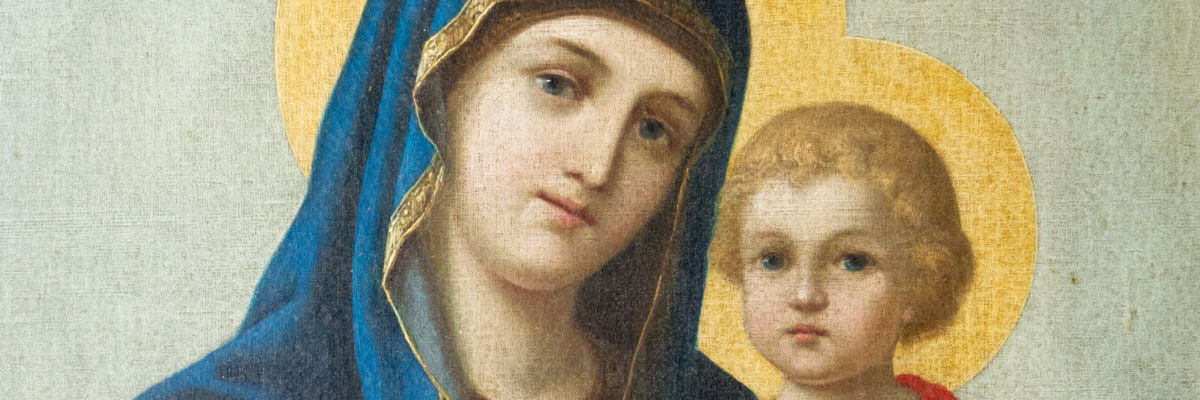
“Behold, a virgin shall conceive and bear a son, and his name shall be called Emmanuel” (Matt. 1:23). That’s how St. Matthew quotes the prophecy of Isaiah 7:14, at the moment he describes the prophecy’s fulfillment by Mary and Jesus. But did Isaiah really say that?
In modern times, a great deal of controversy has centered around the meaning of the Hebrew word that Isaiah uses, `almah. Critics argue that the word more accurately means “young woman,” and that if Isaiah wanted to prophesy about a virgin birth, he would have used the word bethuwlah instead. Such critics typically hold that the prophecy is simply about Isaiah telling King Ahaz about the birth of another member of his royal lineage.
Yet the context of the passage shows the absurdity of such a rendering. King Ahaz had multiple sons and was secure enough in his dynasty that 2 Chronicles 28:3 notes that he “burned his sons as an offering” to the pagan god Moloch. Isaiah came to him to offer a sign as “deep as Sheol or high as heaven” (Isa. 7:11), and we’re to read this as simply another royal son?
Rather, the prophesied child to be born is no ordinary king but “his name name will be called ‘Wonderful Counselor, Mighty God, Everlasting Father, Prince of Peace’” (Isa. 9:6). Nothing within the life and times of King Ahaz or his sons corresponds to this, nor are there any instances in the Old Testament of a mere human being given the title “Mighty God.” The grandness of Isaiah’s prophecy is inconsistent with it being about the ordinary birth of another royal.
The Hebrew word na`arah meant “young woman” with no suggestion of virginity (see, e.g, Amos 2:7). Bethuwlah meant “virgin” (related to bethuwliym, “virginity”) with no suggestion of youth. But the word used here, `almah, had the sense of both youth and virginity, like the English words “maiden” and “maidenhead.” Often overlooked in the modern linguistic debates is that, in the ancient world, young, unmarried women were presumed to be virgins, barring reason to believe otherwise.
But perhaps most importantly, the Septuagint, the oldest translation of the Hebrew Scriptures in Greek (approximately three centuries before the birth of Christ), translated `almah here as parthenos, meaning “virgin.” Why does this matter? Because it shows that the Jews long before the birth of Christ recognized this as a prophecy about a virgin birth.
Why does the Virgin Birth matter? St. Thomas Aquinas offers four reasons: first, because of the dignity of God the Father, that he might not share that fatherhood with another; second, because Mary’s purity was fitting for the purity of the Word of God; third, to avoid transmission of original sin; and finally, because Christ’s birth to a Virgin Mother prefigures our own birth to the virgin mother, the Church.
The question of the Virgin Birth—and the broader question of Mary’s perpetual virginity—is a question about holiness. Hagios, the New Testament word for “holiness,” means “a thing set apart for God.” The last eight chapters of Ezekiel contain a lengthy description of the prophet’s vision of a new and miraculous Temple, a prophecy fulfilled not in a physical building but in the body of Jesus Christ (cf. Ez. 47:1-9; John 2:19-21, 7:37-38). Surrounding this Temple is a closed gate, facing east. God revealed that “this gate shall remain shut; it shall not be opened, and no one shall enter by it; for the Lord, the God of Israel, has entered by it; therefore, it shall remain shut” (Ez. 44:2).
The Church Fathers saw in this a reference to Mary’s perpetual virginity. For example, St. Gregory the Wonderworker, a second-century Church Father famed for his miracle-working, described Mary as “herself both an honorable temple of God and a shrine made pure, and a golden altar of whole burnt offerings,” and “the door which looks eastward”—that is, the closed gate of Ezekiel 44:2.
Analogously, two of the four evangelists point out that Christ’s tomb was “a new tomb where no one had ever been laid” (John 19:41, cf. Matt. 27:59-61). Why note such a detail? The tomb of Christ is holy, and so no one before or since has ever been buried in it. Likewise, when Jesus says that “the bread which I shall give for the life of the world is my flesh” (John 6:51), this flesh is taken entirely from his mother Mary.



